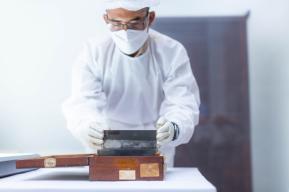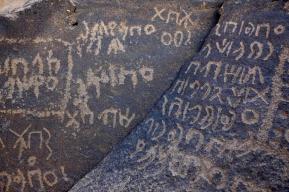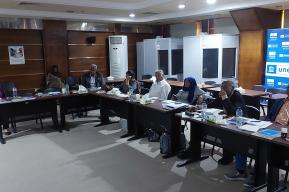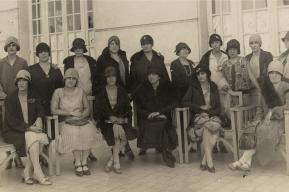News
UNESCO preserves AlUla’s documentary heritage - a library for cross-cultural dialogue
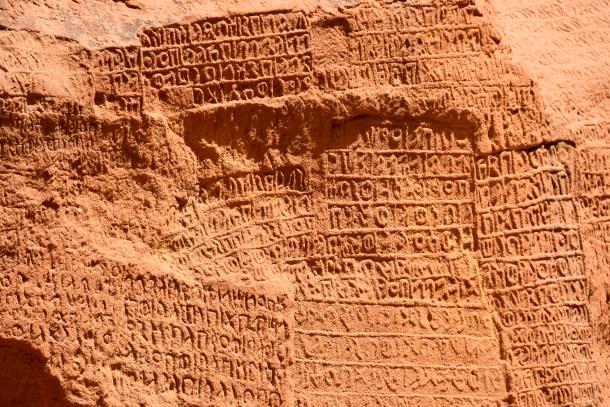
Situated along ancient trade and pilgrimage routes connecting the Arabian Peninsula, the Mediterranean area, and Asia, AlUla was a crossroads where the region’s shared cultural heritage developed, and where the origins of the Arabic language can be traced back in time. Today, the evolution of the Arabic language remains on mountain walls, with the Inscription of Zuhair—the earliest dated Islamic inscription from 644 CE—etched into a rock in Kufic Arabic, a raw archetype of the Arabic script.
Along with early Arabic inscriptions, over 500 engravings populate the ‘open library’ of Jabal Ikmah, where ancient scripts in the Lihyanite, Dadanitic, Aramaic, Thamudic, and Minaic languages are still being unearthed and examined today. Hundreds more are inscribed across Abu Ud Valley and Al Aqra’a Mountain. With the inscriptions attesting to a shared heritage across different civilizations, the MoW Programme endeavours to preserve such documentary heritage for its significance in recording the cultural memory of AlUla, Saudi Arabia as a whole, as well as for the larger Arab world.
UNESCO’s Assistant Director General for Communications and Information, Dr Tawfik Jelassi, said: “The documentary heritage in AlUla exhibits the significance of AlUla as a region in which the Arabic language was formed through cross-cultural exchanges over generations. It has the same potential today to serve as a unique stage for all of us coming from diverse Arab states, to enrich dialogue within the region and globally.”
Dr Jelassi sees this project as “an opportunity in the face of risks to the region’s inscriptions and manuscripts to equip memory institutes with tools for preserving our documentary heritage, to animate the Arab world’s public awareness of its significance and use it as a force for unity, diversity and intercultural dialogue.”
Jose Ignacio Gallego Revilla, Executive Director of the Kingdoms Institute, Royal Commission for AlUla (RCU), said, “Our joint participation in the MoW Programme sets the best standards as part of the outstanding cooperation between the Royal Commission for AlUla and UNESCO, as well as the Kingdoms Institute’s commitment to the preservation of the most fragile values of our cultural inheritance. Our documentary heritage is an essential and vital part of our collective memory, shared by those who left for us a testimony of their lives for the generations to come.”
The MoW Programme’s aims to preserve documentary heritage in AlUla by contributing to ensure its permanent universal access and by maximizing its potential to serve as a tangible resource for intercultural dialogue, social cohesion and education.
As part of its partnership with RCU through its Kingdoms Institute, responsible for archaeological research and conservation, UNESCO is facilitating the revival of AlUla as a cultural hub, promoting its documentary heritage through various initiatives, including an exhibition, capacity-building workshops, an online platform, and a flagship conference scheduled in 2023. The Kingdoms Institute Platform for the Promotion of Documentary Heritage in the Arab world will aim to enhance the capacity of memory institutions from the Arab world to effectively identify, preserve, and enable access to the documentary heritage that makes up the shared past of our humanity and continues to shape our present cultures.
About the Memory of the World (MoW) Programme
UNESCO’s MoW Programme facilitates the preservation of documentary heritage, including manuscripts, engravings, and rare books, that form our cultural heritage, ensuring its accessibility and enhancing public awareness of its significance to safeguard it against decay or disregard.
About the Royal Commission for AlUla (RCU)
The RCU was established in 2017 to elevate the significance of AlUla’s cultural heritage for present and future generations. In accordance with Saudi Arabia’s Vision 2030, RCU’s development in AlUla encompasses initiatives within archaeology, education, tourism and arts.



